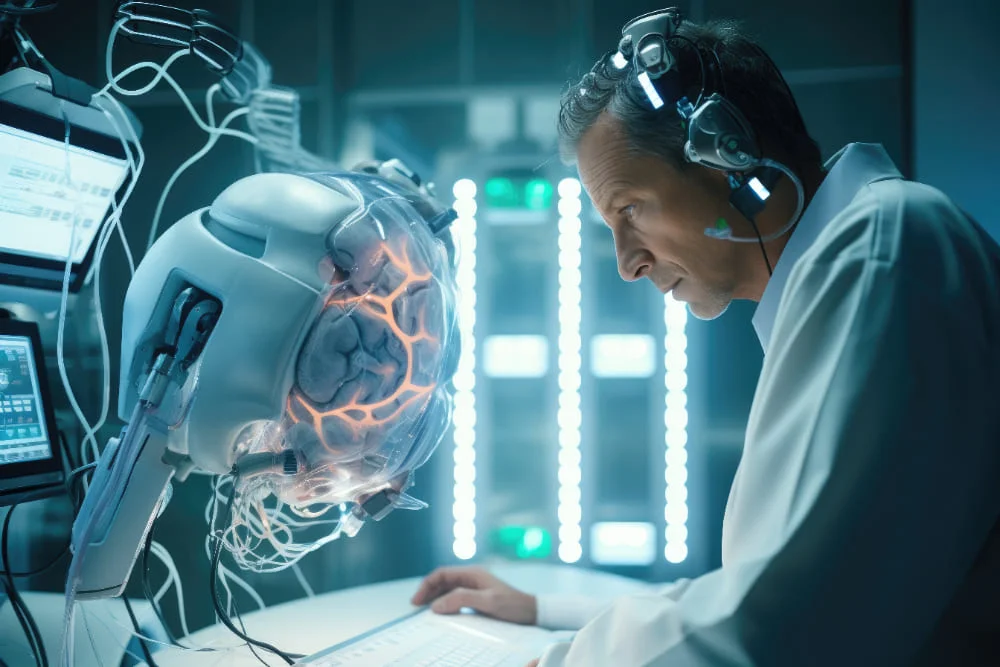Machine Learning(ML) and Artificial Intelligence (AI) is no longer a futuristic concept—it’s a powerful force driving business transformation across industries. From automating routine tasks to enhancing decision-making, AI is revolutionizing how businesses operate, making them more efficient, data-driven, and customer-centric. Today, companies of all sizes are leveraging AI and machine learning (ML) to gain a competitive edge, streamline operations, and improve customer experiences.
In the past, AI was primarily associated with research labs and tech giants, but now, it has become an essential tool for businesses across diverse industries such as healthcare, finance, retail, logistics, and beyond. AI-powered solutions like predictive analytics, chatbots, personalized recommendations, fraud detection, and robotic process automation (RPA) are reshaping industries and enabling organizations to scale like never before. With advancements in deep learning, natural language processing (NLP), and computer vision, AI has reached new heights, making its integration into businesses more seamless and impactful.
As AI technology continues to advance, its impact on businesses will only grow stronger. Emerging trends such as Generative AI, AI-powered automation, and hyper-personalization will further enhance how businesses interact with customers and optimize internal processes. The integration of AI with the Internet of Things (IoT), blockchain, and edge computing will create new opportunities for innovation and efficiency.
In the sections ahead, we’ll explore the role of AI in business transformation, industry-specific AI applications, challenges in AI adoption, future trends, and how Cenozic can help businesses harness AI for growth and success. Whether you’re a startup or an enterprise, understanding AI’s potential will be crucial in staying ahead in the digital era. Throughout this blog, we will cover the following key topics:
- The Role of Machine Learning in Business Transformation
- Key Industries Benefiting from AI and Machine Learning
- AI-Driven Automation: Redefining Workflows
- Challenges and Ethical Considerations in AI Adoption
- Future Trends in AI and Machine Learning
- How Cenozic Can Help in AI Development
In this blog, we will delve into the profound impact that artificial intelligence (AI) is having on the future of businesses across various sectors. We will examine key industry trends that are emerging as a result of AI advancements, including automation, data analytics, and personalized customer experiences. We will highlight the role of AI-powered solutions in enhancing operational efficiency, streamlining decision-making processes, and fostering deeper customer engagement. By understanding these dynamics, organizations can better navigate the evolving landscape and leverage AI to drive innovation and growth in their operations.
The Role of Machine Learning in Business Transformation
Machine Learning (ML) is fundamentally changing the landscape of business operations, decision-making processes, and customer interactions. By harnessing the power of data-driven insights and advanced automation techniques, ML empowers organizations to significantly enhance their efficiency, reduce operational costs, and stimulate innovative practices.

In sectors such as healthcare, ML enables personalized treatment plans by analyzing patient data to predict outcomes. In finance, it streamlines risk assessment and fraud detection through sophisticated algorithms. Retailers utilize ML to optimize inventory management and create personalized shopping experiences, while logistics companies leverage it to improve supply chain efficiencies and predict delivery times.
From predictive analytics that forecast future trends to intelligent automation that enhances daily tasks, ML-powered solutions are not only transforming these industries but also redefining the way businesses interact with their clients and adapt to changing market conditions.
1. Data-Driven Decision Making
One of the most significant impacts of Machine Learning in business transformation is its ability to process vast amounts of data and extract valuable insights. Traditional decision-making relied on historical data and human intuition, but ML algorithms analyze patterns, trends, and behaviors to provide more accurate and real-time recommendations.
For example, financial institutions use ML models to assess credit risks, detect fraudulent transactions, and optimize investment strategies. Similarly, businesses in eCommerce and retail leverage ML for demand forecasting, customer segmentation, and personalized marketing campaigns.
2. Intelligent Automation and Efficiency
ML-powered automation is streamlining operations by reducing manual tasks and improving productivity. Repetitive tasks such as data entry, invoice processing, and customer support are now automated using ML-based systems, freeing up employees to focus on higher-value tasks.
For instance, AI-powered chatbots and virtual assistants powered by Natural Language Processing (NLP) enhance customer service by handling inquiries, processing transactions, and providing personalized recommendations. In manufacturing, ML-driven predictive maintenance ensures machinery runs efficiently, reducing downtime and operational costs.
3. Enhancing Customer Experience
Businesses today rely on ML to personalize customer interactions and enhance user experience. By analyzing customer behavior, preferences, and purchase history, ML helps businesses deliver tailored product recommendations, personalized marketing messages, and dynamic pricing strategies.
Streaming services like Netflix and Spotify use ML to suggest content based on user preferences. Similarly, eCommerce platforms like Amazon utilize recommendation engines to drive sales by showcasing relevant products to customers. This level of personalization increases customer engagement, retention, and overall satisfaction.
4. Fraud Detection and Risk Management
ML plays a crucial role in fraud detection and risk assessment across industries, particularly in banking, insurance, and cybersecurity. ML models analyze transactional patterns and detect anomalies in real-time, helping businesses prevent fraudulent activities before they cause significant financial damage.
For example, financial institutions use ML-powered fraud detection systems to identify suspicious transactions, flagging unauthorized activities and reducing fraud-related losses. In cybersecurity, ML enhances threat detection by continuously monitoring network activities and identifying potential security breaches.
5. Predictive Analytics and Forecasting
ML-powered predictive analytics helps businesses anticipate future trends, optimize resource allocation, and improve decision-making. Industries like healthcare, retail, and logistics use ML to forecast demand, identify potential risks, and streamline supply chain management.
In healthcare, ML models analyze patient data to predict disease outbreaks, recommend treatments, and improve patient outcomes. Retail businesses use ML to optimize inventory management, ensuring they stock the right products at the right time.
Read Also: The Role of AI in Mobile App Development: Smarter and Faster Apps
Key Industries Benefiting from AI and Machine Learning
Artificial Intelligence (AI) and Machine Learning (ML) are driving a significant transformation across various industries worldwide, enhancing operational efficiency, precision, and informed decision-making. In healthcare, AI algorithms are used to analyze patient data, diagnose conditions, and personalize treatment plans, leading to improved patient outcomes. The finance sector benefits from ML models that detect fraud, assess credit risk, and optimize trading strategies, thereby increasing security and profitability.

In retail, AI technologies enhance customer experiences through personalized recommendations and inventory management, allowing retailers to respond more effectively to consumer demand. Meanwhile, in logistics, AI optimizes supply chain operations by predicting delays, managing routes, and automating warehousing processes. At the forefront of these advancements, Cenozic’s cutting-edge AI and ML solutions are not only reshaping traditional business practices but also empowering organizations to innovate and maintain a competitive edge in an increasingly dynamic market. We will examine key industries benefiting from AI and ML.
1. Healthcare – Revolutionizing Patient Care and Diagnosis
AI and ML have impacted the healthcare industry, improving diagnosis, patient care, and operational efficiency. These technologies help medical professionals make faster, more accurate decisions, ultimately leading to better patient outcomes. Bill Gates predicts that within the next decade, AI will provide high-quality medical advice and education, potentially reducing the need for human doctors and teachers.
By analyzing vast amounts of data quickly and accurately, these technologies empower healthcare providers to make timely and precise decisions. As a result, patients experience more accurate and personalized treatment plans, which significantly enhances their overall health outcomes.
Key Benefits of AI in Healthcare:
- Predictive Diagnostics – AI-powered tools analyze medical records, genetic data, and imaging scans to detect diseases at early stages. For example, ML algorithms in radiology can identify cancerous tumors more accurately than traditional methods.
- Personalized Treatment Plans – AI and machine learning are shaping the future of healthcare by helping doctors create tailored treatment strategies based on a patient’s medical history, which ensures better treatment efficacy.
- Medical Chatbots and Virtual Assistants – AI-driven chatbots assist patients in scheduling appointments, answering queries, and providing initial diagnosis recommendations.
- Drug Discovery – AI accelerates drug development by analyzing molecular data, reducing the time and cost of bringing new medicines to market.
Read Also: An Ultimate Guide : How to Develop a Healthcare App
2. Finance – Enhancing Security, Fraud Detection, and Investment Strategies
AI and ML have become indispensable in the finance sector, enabling banks, investment firms, and insurance companies to optimize their services, detect fraud, and improve customer experiences. Through sophisticated algorithms, AI and ML can analyze vast amounts of data in real-time, allowing financial institutions to identify fraudulent activities quickly and accurately. This not only safeguards companies against potential losses but also improves customer trust and satisfaction.
Key Benefits of AI in Finance:
- Fraud Detection and Risk Management – AI-powered systems monitor real-time transactions to identify fraudulent activities and prevent financial crimes.
- Algorithmic Trading – Machine learning models analyze market trends and execute trades with minimal human intervention, maximizing profits.
- Personalized Financial Planning – Robo-advisors use AI to provide automated investment advice tailored to individual financial goals.
- Automated Loan Processing – AI evaluates creditworthiness by analyzing alternative data sources, improving loan approval rates for underserved populations.
Read Also: The Role of AI and Blockchain in Modern Fintech Software Development
3. Retail & E-commerce – Personalization and Customer Insights
AI and ML are reshaping the retail and e-commerce industries by offering personalized shopping experiences and optimizing supply chain management. AI-driven analytics streamline inventory management and logistics, ensuring products are available when and where they are needed most, thereby enhancing overall operational effectiveness.
Key Benefits of AI in Retail & E-commerce:
- Recommendation Engines – AI suggests products based on user behavior, increasing sales and customer engagement.
- Inventory Management – ML predicts demand fluctuations, ensuring optimal stock levels and reducing overstock or shortages.
- Visual Search & Augmented Reality (AR) – AI enables customers to search for products using images and try them virtually before purchase.
- Chatbots & Virtual Shopping Assistants – AI-powered bots handle customer inquiries and assist in making purchase decisions.
Read Also: How Retail Software Development is Shaping the Future of Customer Experience
4. Logistics & Supply Chain – Improving Efficiency and Route Optimization
The logistics sector is increasingly harnessing the power of artificial intelligence to streamline operations, significantly reduce costs, and optimize delivery times. By integrating advanced algorithms and data analytics, companies are able to predict demand more accurately, track shipments in real-time, and automate various processes. This not only enhances efficiency but also improves customer satisfaction by ensuring timely and reliable deliveries.
Key Benefits of AI in Logistics & Supply Chain:
- Route Optimization – AI analyzes traffic patterns, weather conditions, and delivery constraints to determine the most efficient delivery routes.
- Warehouse Automation – ML-powered robots assist in packaging, sorting, and moving inventory within warehouses.
- Demand Forecasting – AI predicts demand trends, helping companies adjust inventory and supply chain operations accordingly.
- Autonomous Vehicles & Drones – AI-driven self-driving trucks and drones are transforming last-mile delivery.
Read Also: How Logistics Software Development Can Transform Supply Chain Efficiency?
5. Manufacturing – Enabling Smart Factories and Predictive Maintenance
AI and ML are revolutionizing the manufacturing industry by making factories smarter and more efficient. By integrating advanced algorithms and data analysis, these technologies are making factories smarter, enabling them to optimize production processes, reduce waste, and enhance overall efficiency. As a result, manufacturers can respond more swiftly to market demands, improve product quality, and streamline operations, paving the way for a more innovative and competitive industry.
Key Benefits of AI in Manufacturing:
- Predictive Maintenance – AI detects potential equipment failures in advance, reducing downtime and maintenance costs.
- Quality Control – ML algorithms analyze production data to detect defects and ensure high product quality.
- Supply Chain Optimization – AI predicts material demand, improving procurement and reducing waste.
- Robotic Process Automation (RPA) – AI-powered robots streamline production processes, reducing human error.
6. Education – Personalized Learning and AI Tutors
AI is revolutionizing the education sector by tailoring learning experiences to meet individual needs and making educational resources accessible to a broader audience. By analyzing student performance and preferences, AI can create customized lesson plans, provide real-time feedback, and adapt teaching methods to suit different learning styles. This transformative technology not only enhances engagement but also ensures that learners from diverse backgrounds have equal opportunities to succeed in their educational journeys.
Key Benefits of AI in Education:
- Adaptive Learning Platforms – AI tailors lessons based on individual learning speeds and styles.
- AI Tutors & Chatbots – Virtual assistants provide instant support to students, answering queries and explaining concepts.
- Automated Grading – AI-powered tools assess assignments, saving teachers valuable time.
- Predictive Analytics for Student Performance – AI analyzes student performance data to identify struggling students early.
7. News & Magazine – Content Personalization and AI-Generated Content
The news and magazine sector is increasingly harnessing the power of artificial intelligence to enhance various aspects of its operations. AI technologies are being employed to streamline content creation, allowing creators to produce high-quality works more efficiently. In addition, AI-driven recommendation systems are analyzing viewer preferences and behaviors to suggest personalized content, helping audiences discover new shows and movies that align with their interests. Furthermore, AI is playing a pivotal role in audience engagement, enabling companies to interact with fans in real time, analyze feedback, and tailor experiences that resonate more deeply with viewers.
Key Benefits of AI in News & Magazine:
- Personalized Content Recommendations – Streaming services like Netflix use AI to suggest content based on user preferences.
- AI-Generated Content – AI creates articles, music, and even video content.
- Automated Video Editing & Production – AI tools streamline video editing, enhancing production quality.
- Deepfake & CGI Advancements – AI enhances digital animation and special effects in movies and TV shows.
Read Also: AI in E-commerce: Enhancing Customer Experience & Engagement
AI-Driven Automation: Redefining Workflows
Artificial Intelligence (AI) is ushering in a transformative era across industries worldwide, with automation taking center stage in this revolutionary shift. AI-driven automation is not just refining workflows; it’s completely redefining how work is done by maximizing operational efficiency, minimizing human error, and empowering businesses to devote more resources to strategic growth initiatives.
From automating mundane, repetitive tasks that once consumed valuable time, to streamlining complex decision-making processes with data-driven insights, AI-driven automation significantly enhances productivity and accuracy. Furthermore, by personalizing and enriching customer experiences, it fosters deeper connections between organizations and their clientele.

We will discuss how AI-driven automation is transforming workflows, highlighting the numerous benefits it brings. We will also examine its significant impact across various industries, including manufacturing, healthcare, finance, and retail. Join us as we explore this exciting technological frontier that is reshaping the landscape of modern business.
Understanding AI-Driven Automation
AI-driven automation encompasses the implementation of advanced artificial intelligence technologies, including machine learning (ML), natural language processing (NLP), and robotic process automation (RPA), to execute tasks traditionally performed by human workers. Unlike basic automation, which strictly adheres to predefined rules and scripts, AI-driven automation possesses the remarkable ability to learn from data, adapt to changing conditions, and continually enhance its performance over time. This dynamic capability not only streamlines workflows but also results in smarter, more efficient processes that can respond to new challenges and optimize resources in real-time.
Key Components of AI-Driven Automation:
- Machine Learning (ML): Enables systems to analyze data, identify patterns, and make informed decisions without human intervention.
- Natural Language Processing (NLP): Helps machines understand, interpret, and respond to human language, improving customer service and communication.
- Robotic Process Automation (RPA): Automates repetitive tasks such as data entry, document processing, and customer inquiries.
- Computer Vision: Allows machines to analyze and interpret visual data, making automation applicable to industries like healthcare and manufacturing.
How AI-Driven Automation is Transforming Workflows
Traditional workflows often depend on manual intervention, relying heavily on human effort and time-consuming processes. This reliance can lead to a higher risk of errors, as tasks are performed repetitively and without the precision that technology can provide. In contrast, AI-driven automation is revolutionizing this landscape.
By integrating sophisticated algorithms and advanced technologies, these intelligent systems operate independently, significantly reducing the need for human oversight. This shift not only accelerates workflows but also enhances overall efficiency, allowing organizations to streamline their operations and focus on more strategic initiatives.
Key Areas of Workflow Transformation:
- Task Automation: Repetitive tasks such as data entry, invoicing, and report generation are automated, freeing up employees for higher-value work.
- Process Optimization: AI analyzes workflow data to identify inefficiencies and suggest improvements.
- Decision-Making: AI-powered analytics provide real-time insights, enabling businesses to make informed decisions quickly.
- Customer Interactions: AI chatbots and virtual assistants enhance customer support by providing instant responses and personalized recommendations.
- Predictive Maintenance: AI predicts equipment failures before they occur, reducing downtime in industries like manufacturing and logistics.
The Future of AI-Driven Automation
AI-driven automation is on the brink of continuous evolution, leading to the development of advanced applications that have the potential to revolutionize a diverse array of industries. As this cutting-edge technology advances, we can look forward to a wealth of innovative solutions designed to significantly enhance operational efficiency, optimize workflows, and elevate decision-making processes.
This transformation will impact sectors such as manufacturing—where smart robotics can improve production lines, healthcare—through predictive analytics that offer personalized patient care, finance—by automating complex transactions, and many others. The future of AI-driven automation presents exciting possibilities for all industries, promising to reshape the way we work and live.
Key Trends to Watch:
- Hyperautomation: Combining AI, RPA, and analytics for end-to-end process automation.
- AI-Powered Decision Making: AI will become a strategic partner in business decision-making, providing real-time insights.
- Autonomous Workforces: AI-driven bots and virtual assistants will handle more complex tasks, further reducing manual work.
- AI and IoT Integration: Smart devices will communicate seamlessly, automating entire ecosystems.
Future Trends in AI and Machine Learning
Artificial Intelligence (AI) and Machine Learning (ML) are rapidly advancing fields that are transforming the landscape of businesses and industries worldwide. This evolution is not only driven by technological innovation but also by the increasing demand for efficiency and smarter decision-making processes. As we witness the rise of new AI-powered applications, organizations are finding ways to enhance productivity through automation and data-driven insights.
Generative AI, for instance, has opened up new avenues for creativity and content generation, enabling businesses to produce original text, images, and even music with minimal human intervention. Meanwhile, autonomous systems are reshaping industries such as transportation and manufacturing, where self-driving vehicles and robotic automation can significantly reduce operational costs and improve safety.

Ethical AI is also becoming a crucial focus as organizations strive to implement responsible practices that ensure transparency and fairness in AI technologies. This is vital for building consumer trust and addressing concerns about bias and privacy. Additionally, hyper-personalization is emerging as a powerful tool for businesses to tailor their products and services to individual preferences, leading to enhanced customer experiences and loyalty. As these areas of AI and ML continue to evolve, we are only beginning to grasp their full potential and impact, making it an exciting time for innovation and growth across various sectors.
Generative AI and Its Expanding Applications
Generative AI, powered by sophisticated models such as GPT (Generative Pre-trained Transformer) and DALL-E, has rapidly gained popularity and recognition in recent years. According to The Guardian, Since the introduction of ChatGPT in 2022, AI has become more prevalent, even among children under 13. Parents and educators are increasingly introducing AI tools to young learners to prepare them for future academic and professional environments.
Our advanced technologies, powered by Generative AI development and AI consulting services, can produce a wide range of impressive outputs. These include coherent and contextually rich text, stunning and imaginative images, engaging videos, captivating music, and even complex software code. By pushing the boundaries of what artificial intelligence can achieve, these models are transforming the landscape of creativity and innovation, opening up new possibilities in various fields.
Key Applications of Generative AI:
- Content Creation: AI-generated text, articles, and creative writing for marketing and media.
- Design and Art: AI-powered tools for generating digital art and design concepts.
- Software Development: AI-assisted coding and debugging, improving software development efficiency.
- Healthcare: AI-generated molecular structures for drug discovery and personalized medicine.
As generative AI continues to evolve, businesses will integrate it into various creative and problem-solving applications, transforming industries like marketing, entertainment, and research.
AI-Powered Hyper-Personalization
Personalization plays a vital role in enhancing customer experiences, and AI is revolutionizing this concept through hyper-personalization. By meticulously analyzing vast amounts of user data, AI can gain insights into individual customer preferences, behaviors, and needs. This allows it to create uniquely tailored experiences that resonate deeply with each user, transforming mundane interactions into engaging and meaningful moments. With the power of hyper-personalization, businesses can connect with their customers on a more personal level, fostering loyalty and satisfaction.
How AI Drives Hyper-Personalization:
- E-commerce: Personalized product recommendations based on user behavior and past purchases.
- Healthcare: AI-driven personalized treatment plans based on patient data and medical history.
- Media & News: AI-curated content recommendations for streaming platforms like Netflix and Spotify.
- Fintech: AI-powered financial advisory and investment recommendations.
Hyper-personalization will continue to shape customer engagement, making interactions more relevant and impactful.
AI in Automation: The Rise of Autonomous Systems
AI-driven automation is transforming industries in remarkable ways, and the future promises a broader integration of autonomous systems across diverse sectors. Imagine a world where self-driving vehicles navigate our roads with precision, reducing traffic congestion and minimizing accidents. In supply chain management, AI-powered systems analyze vast amounts of data to optimize logistics, streamline operations, and reduce costs. These innovative technologies will not only enhance operational efficiency but also significantly diminish our reliance on human intervention, paving the way for a more automated and efficient future.
Key Areas Where Autonomous AI Will Thrive:
- Autonomous Vehicles: AI-powered self-driving cars, trucks, and drones.
- Smart Factories: AI-driven robotic automation in manufacturing and production.
- AI-Powered Warehouses: Automated inventory management and order fulfillment.
- Autonomous Financial Trading: AI-driven algorithmic trading and investment strategies.
Autonomous AI is set to reshape the workforce, enhancing productivity and driving innovation in industries like logistics, transportation, and fintech.
Ethical AI and Responsible AI Development
As artificial intelligence continues to grow in sophistication and capability, ethical concerns related to bias, privacy, and accountability are taking center stage. Increasingly, organizations—from corporate entities to government bodies—are dedicating resources to the creation of ethical AI systems. These systems strive to align with fundamental human values and ensure fairness in their operations, fostering trust and responsibility in their applications.
Key Focus Areas for Ethical AI:
- Bias & Fairness: Ensuring AI models are unbiased and provide fair decisions.
- Transparency & Explainability: Making AI decision-making processes understandable and interpretable.
- Data Privacy & Security: Implementing robust data protection measures to prevent misuse.
- AI Regulations: Governments worldwide are working on AI governance frameworks to regulate AI applications.
The future of AI will involve a balance between technological advancements and ethical considerations to ensure responsible AI deployment.
AI for Cybersecurity and Threat Detection
As cyber threats continue to evolve and become increasingly sophisticated, artificial intelligence (AI) is proving to be essential in the fight against security risks. AI-driven cybersecurity solutions are designed to proactively identify anomalies within network traffic and user behavior, enabling organizations to detect potential breaches before they cause significant harm.
These advanced technologies can analyze vast amounts of data to prevent fraud by recognizing suspicious patterns and activities. By automating threat detection and response, AI enhances overall network security, allowing businesses to maintain a safer digital environment and protect sensitive information from a growing array of cyberattacks.
AI in Cybersecurity:
- Real-Time Threat Detection: AI identifies unusual network behavior and potential attacks.
- Fraud Prevention: AI-powered systems detect fraudulent transactions in banking and e-commerce.
- Automated Incident Response: AI takes immediate action against security breaches.
- AI-Powered Identity Verification: Enhancing authentication systems using AI and biometrics.
AI-driven cybersecurity will be a critical investment for businesses looking to protect their digital assets and customer data.
How Cenozic Can Help in AI Development
Artificial Intelligence (AI) is revolutionizing businesses across industries by enhancing automation, improving decision-making, and unlocking new opportunities for growth. Whether it’s machine learning, generative AI, computer vision, or AI-powered automation, businesses need expert AI development services to build scalable, intelligent, and future-ready solutions. At Cenozic, we specialize in providing custom AI development services, helping businesses integrate AI-driven solutions tailored to their unique needs. From data-driven insights to automated workflows and personalized user experiences, our AI solutions empower businesses to stay ahead in the digital landscape.
Why Choose Cenozic for AI Development?
At Cenozic, we specialize in merging advanced AI technologies with extensive industry expertise to develop robust, scalable, and high-performance AI applications tailored to your specific needs. Our team of skilled professionals is dedicated to understanding the unique challenges of your business and leveraging the latest innovations in artificial intelligence to create solutions that drive efficiency and growth. At Cenozic, we pride ourselves on our unique ability to integrate cutting-edge AI technologies with deep industry knowledge, enabling us to develop powerful, scalable, and high-performance AI applications customized to meet your specific requirements.

Our talented team of professionals is committed to thoroughly understanding the distinct challenges faced by your business, allowing us to harness the latest advancements in artificial intelligence to craft innovative solutions that enhance efficiency and foster growth. We provide a wide array of AI development services designed to address various aspects of your operational needs, including:
Custom AI Solutions for Your Business Needs
AI development is not a one-size-fits-all solution; it requires a deep understanding of the unique needs of each business. At Cenozic, we specialize in providing customized AI solutions tailored specifically to your industry’s challenges and your company’s strategic goals. Our team collaborates closely with you to identify key areas where AI can drive efficiency and innovation.
We leverage cutting-edge AI frameworks, including TensorFlow, PyTorch, and OpenAI, to develop robust AI applications that not only automate processes but also provide valuable insights through data analysis. By integrating advanced machine learning techniques, we ensure that the solutions we deliver are not only effective but also scalable, allowing your business to adapt to changing demands effortlessly. Our commitment is to empower your organization with AI technologies that lead to measurable business outcomes, fostering growth and long-term success.
AI-Driven Automation to Improve Efficiency
Automation serves as a critical catalyst for transforming business processes, enabling organizations to significantly reduce manual workloads while boosting accuracy and enhancing overall efficiency. Our AI-driven automation solutions are designed to help businesses not only streamline their operations but also optimize productivity across various departments. By leveraging advanced machine learning algorithms and intelligent automation technologies, we empower organizations to minimize errors, ensure consistency, and make data-driven decisions with ease.
Our expertise in AI automation enables us to tailor solutions that meet the unique needs of different sectors, allowing for seamless integration into existing workflows. This results in substantial time savings and reduced operational costs, freeing up valuable resources for strategic initiatives. Ultimately, our goal is to help businesses leverage the power of automation to achieve higher levels of operational efficiency, drive innovation, and maintain a competitive edge in their respective markets.
Machine Learning Model Development & Deployment
Machine Learning (ML) serves as a fundamental component driving contemporary AI solutions. At Cenozic, we specialize in the development and deployment of advanced ML models designed to equip businesses with valuable insights and enhance their operational efficiency. Our expertise lies in crafting bespoke ML solutions that leverage your unique data, thereby facilitating smarter decision-making processes, accurate predictive analytics, and seamless automation of routine tasks.
By employing sophisticated algorithms and techniques, our ML models evolve through continuous learning, adapting to new information and trends. This adaptability allows organizations to identify emerging patterns, optimize workflows, and respond proactively to market changes. Whether you’re looking to improve customer experience, streamline your supply chain, or enhance data-driven strategies, we provide organizations with the tools they need to thrive in an increasingly competitive landscape. Let Cenozic empower your business with intelligent, data-driven solutions that pave the way for sustainable growth and success.
Generative AI & Custom GPT Development
Generative AI is transforming the landscape of content creation, customer interactions, and automation in remarkable ways. At Cenozic, we pride ourselves on being at the forefront of this revolution, specializing in innovative Generative AI solutions and custom GPT Development services that produce human-like text, stunning images, engaging videos, and even functional code. Our team harnesses advanced technologies, including OpenAI, Stable Diffusion, and a variety of other cutting-edge AI models, to develop next-generation applications tailored to enhance creativity and boost productivity across diverse industries.
By leveraging our expertise, we aim to not only streamline workflows but also elevate the standard of content generation, allowing businesses to engage more deeply with their audiences. We understand the unique needs of our clients, and through our collaboration, we create customized AI tools that empower users to achieve their objectives more efficiently and effectively. With Cenozic, the future of AI-driven interaction and automation is not just a possibility—it’s a reality that opens new horizons for creativity and innovation.
AI-Powered Data Analytics for Smarter Insights
Data serves as the cornerstone of artificial intelligence, forming the bedrock upon which advanced technologies are built. At Cenozic, we specialize in developing sophisticated AI-powered data analytics solutions designed to empower businesses at every level. Our innovative tools enable organizations to extract actionable insights from their data, uncover hidden trends, and enhance decision-making processes.
By harnessing our expertise in AI-driven analytics, businesses can transform raw data into valuable knowledge. This empowers them to formulate better strategies and make informed decisions that drive growth and efficiency. Our AI services are tailored to meet the unique needs of each client, ensuring they can leverage their data effectively to gain a competitive edge in their industry. With Cenozic, organizations not only navigate their data landscape with confidence but also unlock new opportunities for innovation and improvement.
AI for Healthcare, Retail, and Logistics Industries
AI is revolutionizing various industries, and at Cenozic, we specialize in delivering tailored AI solutions designed to address the unique challenges and opportunities faced by different sectors. Our team is dedicated to developing innovative AI technologies that not only enhance customer experiences but also optimize operations and foster significant business growth. By leveraging advanced data analytics, machine learning, and automation, we create solutions that are specifically aligned with our clients’ objectives, ensuring they stay competitive in an ever-evolving market landscape. Whether it’s improving efficiency in supply chain management or personalizing customer interactions, our industry-specific approach enables us to drive meaningful results across multiple sectors.
Artificial Intelligence (AI) is revolutionizing the way businesses operate, significantly enhancing their efficiency, elevating customer engagement, and improving decision-making processes. Companies that adopt AI technologies are better positioned to outperform their competitors. At Cenozic, we specialize in providing state-of-the-art AI development services designed to meet the unique requirements of your business. Our team works closely with you to create tailored AI solutions that streamline operations, bolster customer interactions, and empower data-driven decision-making, ultimately driving growth and innovation within your organization.


 iOS vs. Android: Which Platform Should You Choose for Your Mobile App?
iOS vs. Android: Which Platform Should You Choose for Your Mobile App?  AI in E-commerce: Enhancing Customer Experience & Engagement
AI in E-commerce: Enhancing Customer Experience & Engagement  How AI-Powered Chatbots Are Revolutionizing Customer Support
How AI-Powered Chatbots Are Revolutionizing Customer Support  The Role of AI in Mobile App Development: Smarter and Faster Apps
The Role of AI in Mobile App Development: Smarter and Faster Apps  How To Choose Top Website Development Company In USA
How To Choose Top Website Development Company In USA 